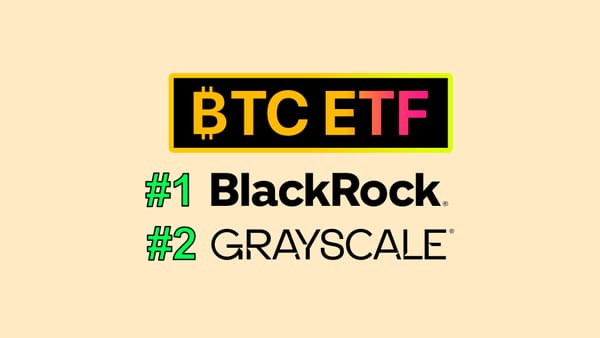
BlackRock's Bitcoin ETF Surpasses Grayscale to Become World's Largest
BlackRock's iShares Bitcoin Trust (IBIT) has become the world's largest bitcoin fund, amassing nearly $20 billion US in assets since its U.S. listing in January, surpassing the long-standing leader Grayscale Bitcoin Trust (GBTC).
As of May 30, 2024, IBIT held $19.68 billion worth of bitcoin, edging past GBTC's $19.65 billion. Fidelity Investments' bitcoin offering ranks third with $11.1 billion in assets.
The launch of IBIT and Fidelity's bitcoin ETFs in January, along with Grayscale's conversion to an ETF structure, have significantly increased bitcoin's accessibility to investors, contributing to the cryptocurrency's price surge to a record high of $73,798 in March.
Since its inception, IBIT has attracted $16.5 billion in inflows, while GBTC experienced outflows of $17.7 billion due to higher fees and arbitrage exits. Grayscale plans to introduce a new fund with lower fees to counteract this trend.
BlackRock's growing dominance in the spot bitcoin ETF market has challenged the oldest and largest bitcoin fund, GBTC, which has seen its market share decline since the launch of IBIT.
IBIT charges a management fee of 0.25%, lower than GBTC's 1.5% and on par with other competitors like Fidelity and ARK Investments. Be sure to see our previous coverage of the Bitcoin ETFs by fee that is updated regularly for the latest information.
BlackRock has benefited from its strong distribution network among independent financial advisors and wealth managers. "We're seeing significant assets moving into the ETF from the wealth community," said Jay Jacobs, U.S. head of thematic and active ETFs at BlackRock.
While some hedge funds reported large positions in the new bitcoin ETFs in Q1, other institutional investors have been slower to embrace them. "We know that this is going to be the longest process," Jacobs said of institutional adoption, noting it could take years in some cases.
The shift in assets from GBTC to IBIT represents a significant change in the supply and demand dynamics for bitcoin funds. "Since its conversion in January, the GBTC unwind has been considered a supply overhang, reducing the positive impact of inflows seen in other vehicles," crypto market maker Wintermute said.
Now, investors will focus more on IBIT's inflows, which "may now drive sentiment and a renewed interest in bitcoin," Wintermute added.
IBIT's rapid ascent has been remarkable, with Bloomberg ETF analyst Eric Balchunas noting, "There's only been one ETF in history to reach $20b in assets in under 1,000 days. IBIT is a hair away at 137 days."
The SEC's approval of spot bitcoin ETFs in January marked a major milestone for the cryptocurrency industry, following years of rejected applications over concerns about market manipulation.
However, SEC Chair Gary Gensler cautioned that the agency's approval of certain spot bitcoin ETFs does not constitute an endorsement of bitcoin itself, urging investors to "remain cautious about the myriad risks associated with bitcoin and products whose value is tied to crypto."
Despite the regulatory green light, cryptocurrencies still lack the comprehensive regulatory framework that governs traditional assets like stocks. But despite the lack of comprehensive regulation, the virtual assets market has continued to grow, with the total market capitalization of cryptocurrencies surpassing $2.57 trillion in May.
As the spot bitcoin ETF market matures, competition among issuers is heating up. BlackRock's strong performance can be attributed in part to its competitive fee structure, which placed it in a fee war with ARK Investment Management even before receiving SEC approval.
The firm's iShares brand and substantial liquidity have also contributed to IBIT's success. By March, just two months after its launch, IBIT had surpassed MicroStrategy Inc in terms of bitcoin holdings.
Looking ahead, the continued growth of spot bitcoin ETFs could play a significant role in driving mainstream adoption of cryptocurrencies and blockchain technology. However, the long-term sustainability of bitcoin as an investment remains a topic of debate, with critics arguing that it lacks the fundamental economic data and fair value from which reliable forecasts can be derived.
As virtual assets and blockchain technology continue to evolve, regulators and market participants alike will need to navigate the complex landscape of risks and opportunities associated with this emerging asset class. The success of BlackRock's IBIT and other spot bitcoin ETFs marks an important milestone in this journey, but the road ahead remains uncertain.